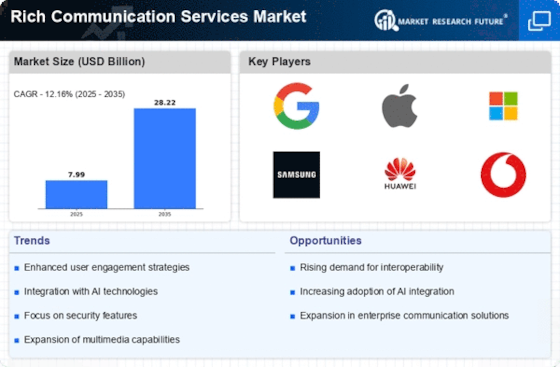Top Industry Leaders in the Rich Communication Service Market

Competitive Landscape of Rich Communication Services (RCS) Market:
The Rich Communication Services (RCS) market is experiencing explosive growth, evolving from a nascent concept to a crucial player in the mobile messaging landscape. This growth is fueled by rising demand for richer communication experiences, increasing smartphone penetration, and the need for brands to engage customers more effectively. Navigating this dynamic market requires a deep understanding of the competitive landscape, key players, and their strategies.
Key Players:
- AT&T (US)
- Vodafone Limited (UK)
- Google (US)
- Verizon (US)
- Telefonaktiebolaget LM Ericsson (Sweden)
- Orange (France)
- KDDI America, Inc. (US)
- Telit (UK)
- SK TELECOM CO., LTD. (Korea)
- Telstra Group (Australia)
- Tanla Solutions Limited (UAE)
- Mavenir (US)
- Nokia (Finland)
- INTEROP TECHNOLOGIES (US)
- Twilio Inc. (US)
Strategies for Success:
- Carrier Partnerships: Forging partnerships with mobile carriers is critical for achieving widespread RCS adoption. Google's RCS Business Messaging initiative, for example, leverages carrier partnerships to offer businesses a standardized messaging platform across networks.
- Feature Differentiation: Players are vying to differentiate themselves through innovative features like group video calling, file sharing, and read receipts. This approach attracts both users and businesses seeking enhanced communication experiences.
- Open Ecosystem Approach: Fostering an open ecosystem is key to driving adoption. Google's Jibe platform, for instance, allows developers to build RCS-based applications and services, encouraging a diverse ecosystem of offerings.
- Focus on Specific Use Cases: Targeting specific verticals like healthcare, finance, and retail with specialized RCS solutions can create market share dominance in niche areas.
Factors for Market Share Analysis:
- Network Coverage: Carriers with a wider RCS network reach naturally have an edge in attracting users and businesses.
- Feature Set and Functionality: Offering a robust and user-friendly feature set differentiates players and drives user adoption.
- Integration Capabilities: Seamless integration with existing messaging platforms and business systems is crucial for enterprise adoption.
- Pricing and Revenue Models: Competitive pricing and innovative revenue models like subscriptions or per-message charges can attract different user segments.
New and Emerging Companies:
- Cloud Communications Providers: Companies like Twilio and Vonage are entering the RCS fray, offering cloud-based RCS solutions that cater to businesses seeking seamless integration with existing communication workflows.
- Conversational AI Platforms: AI-powered chatbots and virtual assistants are being integrated with RCS, creating opportunities for companies like Dialogflow and Rasa to offer automated customer service and marketing solutions.
Current Investment Trends:
- Venture Capital: VC firms are pouring money into promising RCS startups, recognizing the immense potential of the market.
- Mobile Carrier Investments: Carriers are investing heavily in RCS infrastructure and platform development, aiming to capitalize on the growing user base and revenue potential.
- Enterprise Adoption: Businesses are increasingly recognizing the value of RCS for customer engagement and are investing in RCS-based communication solutions.
Latest Company Updates:
January 5, 2024, Telenor launches RCS-based video calling service in Norway, offering high-quality video communication with seamless integration into existing messaging platforms.
December 7, 2023, Google and Samsung collaborate to develop a universal RCS profile, simplifying integration and adoption across different devices and carriers.
October 26, 2023, The RCS Business Messaging standard v5 is released, enabling enhanced features like rich product catalogs, interactive menus, and appointment booking for businesses.










